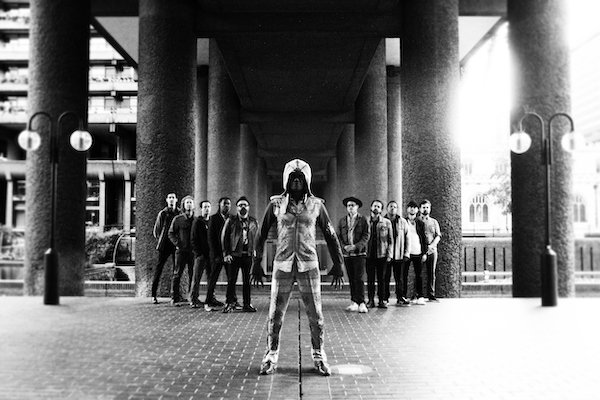Jan 13, 2026 2:09 PM
More Trump-Kennedy Center Cancellations
The fallout from the renaming of the John F. Kennedy Center for the Performing Arts to include President Donald…

Antibalas focuses on the songwriting of its vocalist, Duke Amayo, for Fu Chronicles, an album that marks the ensemble’s 20th anniversary.
(Photo: Céline Pinget)Despite marking two decades as a band, Antibalas recently released its first album that digs deep into Nigerian-American lead singer Duke Amayo’s unique compositional approach. Fu Chronicles (Daptone 060; 48:37 ****) highlights his entrancing narrative song style with the assertive, punchy energy for which the Afrobeat ensemble has become well-known. Amayo isn’t your typical frontman, though he sings at center stage during concerts, his voice and style always has blended seamlessly into the group’s collective sound. And this latest recording marks a compelling synthesis of approaches that began when he met the group’s founders at his Brooklyn kung-fu dojo.
“He was just a dude in the neighborhood, not making music at the time,” Antibalas founder and baritone saxophonist Martín Perna said. “I asked him to fill in one day on percussion, so he started coming through, adding some vocals to songs I had written.”
Before long, Amayo grew into the role of lead singer, while his dojo became the base of operations for the nascent Daptone Records.
Amayo has been composing material for the group throughout its 20-year run—he and Perna are the band’s two permanent members—but this is the first Antibalas album that primarily features his songs.
“Over the years, some of these songs that are on this record were recorded in some form or another, but there wasn’t really an aesthetic container for them. They also felt really personal and idiosyncratic,” Perna said. “A lot of the songs have multiple movements and themes—most of them, when we’d play them live, were 28 minutes long. And if you asked him how they went, he would kind of tell you a different way each time.”
Whereas many jazz classics stretch compact pop tunes through expressively Afro-diasporic sensibilities—think John Coltrane on “My Favorite Things”—Perna’s innovative solution was to take the opposite approach.
“These were songs that we needed to deal with—it’s almost like a musical elephant in the room. These have been kicking around, but why haven’t we been recording them? ... So, I had to basically sit with the tunes, edit them down and figure [it] out.”
Drawing directly from Amayo’s relationship to Nigerian ritual music and sung poetry, Perna and Antibalas managed to crystallize a sympathetic approach within the constraints of the LP format. The album’s six songs feature the group’s trademark grooves, paired with muscular horn lines and background vocals that offer well-timed responses to Amayo’s confident singing. The result is, indeed, idiosyncratic: Timbral references to Amayo’s kung-fu philosophy abound, mixing with West African rhythmic frameworks alongside his Lagos-inflected patois. The hypnotic song-forms allow for Amayo’s narrative compositional style to play out slowly over the course of each track, weaving themes and melodies together in playful and unexpected ways.
This approach is deeply seductive—sinking into Amayo’s compositional approach allows the group to double down on the music’s trance-like elements. The call-and-response between Amayo and backup vocalists on “Koto,” for example—later mimicked by an interlocking horn arrangement—takes the listener into Amayo’s subtle account of the personal tragedies of Williamsburg’s gentrification. Others, like “Fight Am Finish,” are more anthemic, the groove generating a forceful energy that invites the power and discipline of Amayo’s kung-fu sensibilities. The closing track, “Fist Of Flowers,” operates similarly—building toward an unironic call-and-response “flower power” chant that only this vocalist could invoke.
“The way that he writes melodies, the intervals he uses, they sound particularly like him. Every record has different elements of different members’ creative DNA and fingerprints on it,” Perna explained. “This is probably the first [album] that has mostly his.”
Although the engagement with Amayo’s compositions is unique, Fu Chronicles is still an Antibalas record, drawing its power from the size and cohesion of the band’s tight, horn-heavy core. The group’s collective spirit—evident in their enthusiastic backing vocals and raucous collective improvisation—brings an effective balance to Amayo’s charismatic singing. Taken as a whole, the album feels like both a deepening of the band’s core ethos and an expansion of what previously had been possible. DB
This story originally was published in the August 2020 issue of DownBeat. Subscribe here.

Belá Fleck during an interview with Fredrika Whitfield on CNN.
Jan 13, 2026 2:09 PM
The fallout from the renaming of the John F. Kennedy Center for the Performing Arts to include President Donald…

Peplowski first came to prominence in legacy swing bands, including the final iteration of the Benny Goodman Orchestra, before beginning a solo career in the late 1980s.
Feb 3, 2026 12:10 AM
Ken Peplowski, a clarinetist and tenor saxophonist who straddled the worlds of traditional and modern jazz, died Feb. 2…

The success of Oregon’s first album, 1971’s Music Of Another Present Era, allowed Towner to establish a solo career.
Jan 19, 2026 5:02 PM
Ralph Towner, a guitarist and composer who blended multiple genres, including jazz — and throughout them all remained…

Rico’s Anti-Microbial Instrument Swab
Jan 19, 2026 2:48 PM
With this year’s NAMM Show right around the corner, we can look forward to plenty of new and innovative instruments…

Richie Beirach was particularly renowned for his approach to chromatic harmony, which he used to improvise reharmonizations of originals and standards.
Jan 27, 2026 11:19 AM
Richie Beirach, a pianist and composer who channeled a knowledge of modern classical music into his jazz practice,…